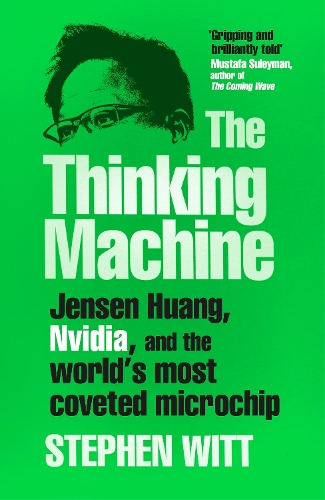
The Thinking Machine: Jensen Huang, Nvidia, and the Worlds Most Coveted Microchip
(Hardback)
Available Formats
Publishing Details
The Thinking Machine: Jensen Huang, Nvidia, and the Worlds Most Coveted Microchip
By (Author) Stephen Witt
Vintage Publishing
The Bodley Head Ltd
17th May 2025
10th April 2025
United Kingdom
Classifications
Tertiary Education
Non Fiction
Artificial intelligence (AI)
Biography: science, technology and medicine
Entrepreneurship / Start-ups
Technology: general issues
Politics and government
Knowledge / Information / Data economics
338.76213815
Physical Properties
Hardback
272
Width 162mm, Height 242mm, Spine 29mm
539g
Description
The explosive story of the tech giant Nvidia - the producer of the only chip anyone involved in AI wants - and its charismatic, uncompromising, complicated CEO, Jensen Huang The riveting investigative account of Nvidia, the tech company that has exploded in value for its artificial intelligence computing hardware, and Jensen Huang, Nvidia's charismatic, uncompromising CEO In March 2024, following the revelation that ChatGPT had trained on Nvidia's microchips, and twenty-one years after its founding in a Denny's restaurant, Nvidia became the third most-valuable corporation on Earth. In The Thinking Machine, acclaimed journalist Stephen Witt recounts the unlikely story of how a manufacturer of video game components shocked Silicon Valley by establishing a monopoly on AI hardware, and in the process re-invented the computer. Essential to Nvidia's meteoric success is its visionary CEO Jensen Huang, who more than a decade ago, on the basis of a few promising scientific results, bet his entire company on AI. Through unprecedented access to Huang, his friends, his investors, and his employees, Witt documents for the first time the company's epic rise and its iconoclastic CEO, who emerges as a compelling, single-minded, and ferocious leader, and now one of Silicon Valley's most influential figures. The Thinking Machine is the story of how Nvidia evolved from selling cheap, aftermarket circuit boards to hundred-million-dollar room-sized supercomputers. It is the story of a determined entrepreneur who defied Wall Street to push his radical vision for computing, in the process becoming one of the wealthiest men alive. It is about a revolution in computer architecture, and the small group of renegade engineers who made it happen. And it's the story of our awesome and terrifying AI future, which Huang has billed as the "next industrial revolution," as a new kind of microchip unlocks hyper-realistic avatars, autonomous robots, self-driving cars, and new movies, art, and books, generated on command.
Reviews
The AI revolution that defines this decade, and probably this century, rests on the shoulders of a shockingly small number of geniuses; and Nvidias Jensen Huang is prominent among them. Witts superb portrait is both entertaining and disquieting, capturing an indispensable, elusive, and isolated man: the hardware wizard behind the machines that are careering toward something very much like sentience -- Sebastian Mallaby, New York Times bestselling author of The Power of Law
PRAISE FOR HOW MUSIC GOT FREE
Terrific, timely, informative ... [Witt's] research and storytelling are exemplary ... How Music Got Free stands comparison to The Social Network
Incredible, possibly canonical ... A story that's too bizarre to make up, but needed to be told ... How Music Got Free is one of the most gripping investigative books of the year * Vice *
You need to get hold of Stephen Witt's jaundiced, whip-smart, superbly report and indispensable How Music Got Free * Washington Post *
Closely reported and brilliantly written ... Highly entertaining * Guardian *
The AI revolution that defines this decade, and probably this century, rests on the shoulders of a shockingly small number of geniuses; and Nvidias Jensen Huang is prominent among them. Witts superb portrait is both entertaining and disquieting, capturing an indispensable, elusive, and isolated man: the hardware wizard behind the machines that are careering toward something very much like sentience -- Sebastian Mallaby, New York Times bestselling author of The Power of Law
PRAISE FOR HOW MUSIC GOT FREE
Terrific, timely, informative ... [Witt's] research and storytelling are exemplary ... How Music Got Free stands comparison to The Social Network
Incredible, possibly canonical ... A story that's too bizarre to make up, but needed to be told ... How Music Got Free is one of the most gripping investigative books of the year * Vice *
You need to get hold of Stephen Witt's jaundiced, whip-smart, superbly report and indispensable How Music Got Free * Washington Post *
Closely reported and brilliantly written ... Highly entertaining * Guardian *
Author Bio
Stephen Witt is the author of How Music Got Free, which was a finalist for the Los Angeles Times Book Prize, the J. Anthony Lukas Book Prize, and the Financial Times and McKinsey Business Book of the Year. His writing has appeared in The New Yorker, Financial Times, New York magazine, Wall Street Journal, Rolling Stone and GQ. He lives in Los Angeles, California.
